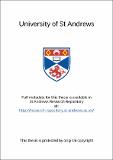Factors influencing the foraging and roosting behaviour of wintering black-tailed godwits (Limosa limosa)
Abstract
This thesis examined the behaviour and ecology of a small population of black-tailed godwits wintering on the Eden Estuary, Scotland. The godwits exhibited the typical behaviour of waders using an inter-tidal habitat during the non-breeding season. However, the godwits spent a surprisingly low proportion of the day feeding and formed a low-water roost. Energy intake during the day was not enough for overall requirements and much feeding must have been occurring at night. The frequency of the two foraging methods of the species was dependent on their relative energy intake rate. Kleptoparasitism occurred between godwits. Although this behaviour was rare, the specialisation of the attacking bird was marked. A food-stealing attempt was targeted in such a way that the probability of a high energy item being taken was great. The godwits were gregarious. Assessing the costs, of interference, and advantages, mainly to do with predators, to an individual of flocking, helped to explain the relative spacing behaviour of birds using the two feeding methods. Godwit3 feeding in their preferred area were adversely influenced by the presence of roosting gulls and plovers. When these heterospecifics were present fewer godwits fed there and those that did foraged in deeper, less profitable, water. In the presence of the roosting flock, the godwits reduced their vigilance rate.-. However, for most individuals this advantage was not great enough to allow them to maintain their feeding performance. Juvenile godwits nave much lower foraging rates than adults. An analysis of the components of foraging investigated the causes of the difference. A detailed study of the low-water roost was made. Although there were microclimate and foraging benefits of being in the roost the overriding advantages were concerned with vigilance and predators.
Type
Thesis, PhD Doctor of Philosopy
Collections
Items in the St Andrews Research Repository are protected by copyright, with all rights reserved, unless otherwise indicated.

